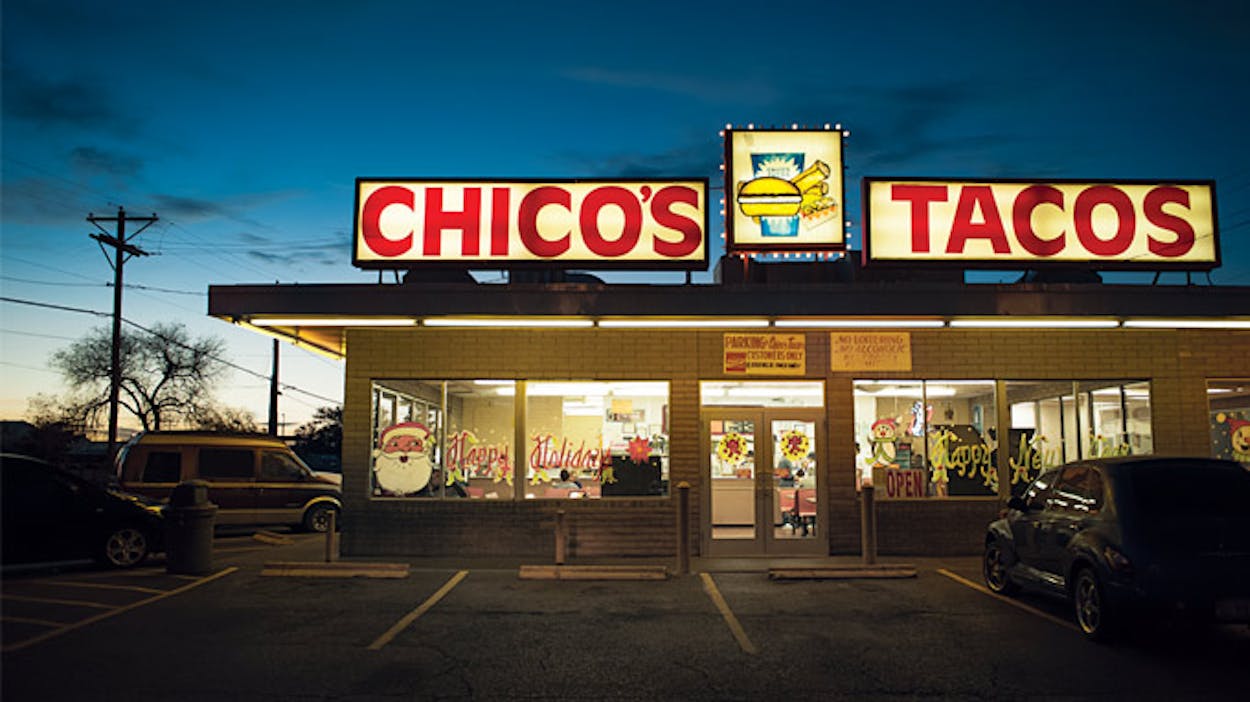Chico’s Tacos sits on Alameda Avenue in a humble area of El Paso known as the Lower Valley. Though a chain of five eateries now share the Chico’s name, el original is this one. Here, wedged between a graveyard and a small park where the homeless often congregate, the city’s most famous hangout has been sustaining El Pasoans with its processed cheese and soupy tomato sauce since the day that late boxing promoter Joe Mora opened its doors, on July 4, 1953.
As a kid, this was my favorite place to go on Friday evenings with my grandmother. I’ve since moved away—for college, for work—but as anybody from El Paso can tell you, Chico’s leaves a greasy imprint, and one cool night this past November, I returned with friends. The restaurant looked radioactive in the darkness, a humming beacon with fluorescent lights that turned the beige brick walls yellow. Inside, the booths were the bright-red vinyl I remembered. Arcade games, the same ones I’d begged quarters from my grandmother for as a rotten eight-year-old, blinked in the corner. It was almost nine at night on the Friday after Thanksgiving, but it was as busy as a lunch-hour rush. An employee rattled off orders over a crackling intercom as families, trailing children in pajamas, pushed through the doors. A group of teenagers giggled by the counter.
Chico’s is gloriously cheap: every item on its black menu boards is, and always has been, under $5. There are the burgers and fries, the grilled cheese sandwiches—or “grillos”—and the hot dogs, which are not really hot dogs at all but two sliced franks on a circular bun with chili beans, mustard, and pickles. And then, of course, the tacos: crispy tortilla flutes stuffed with ground beef, soaked in a thin tomato sauce, and topped with lots of shredded cheese. They come in a small paper boat, in a set of three for a “single” and six for a “double,” but even the less devoted customers know that the better buy is an order of two singles: this guarantees enough sauce and cheese for all your tacos. You smother them in green salsa until they reach perfect, mushy goodness, and then you scoop them up with a white plastic fork.
I am a fan. Still, El Pasoans have a tortured affection for the place, like variations on a bad romance: We love it or hate it. We love to hate it. We hate to love it. Don’t go calling it names, though, because that’s our prerogative alone. Even when the restaurant has disappointed us, as it did in 2009, when it made headlines after the police threw out two gay men from the downtown location for kissing in public, it remains part of our collective identity. That incident ignited a mass protest, but it also opened up debate in a city that often chooses not to confront its old-fashioned conventions. (A friend saved a button from the protest that read “Not All Chicos Like Tacos.”)
“It is hard for me to put into words my appreciation for the place,” said my friend Ryan Martinez as we dug into our tacos. Chico’s, he continued, regularly sweeps reader polls in What’s Up, the local magazine he is the editor of: Best lunch deal. Best place to take out-of-towners. Best place to eat hungover. An oft-recounted story tells of an El Paso woman who woke up from a coma in New York City; the first meal she asked for was tacos from Chico’s. Other places have tried to duplicate the signature tomato sauce to no avail; a copycat restaurant in Austin dubbed Chuco’s Tacos went out of business in 2008.
We stayed until two-thirty, and children were still arriving in their nighties. The women who now appeared wore shorter skirts and longer coats. A group of mariachis ordered some hot dogs to go. Sitting in the back, a man named Cesar Holguin offered his thoughts. “If you go to Philadelphia, you order a Philly cheesesteak,” he said. “If you go to Chicago, you order a Chicago pizza. In El Paso, we have Chico’s.”







